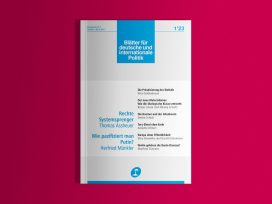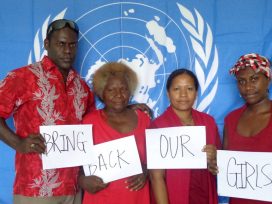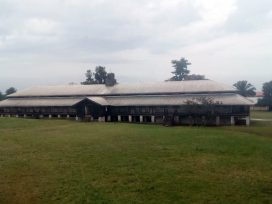Marie Béatrice Umutesi was one of more than one and a half million people who fled Rwanda after the capital, Kigali, was captured by the rebel army, the Rwandan Patriotic Front (RPF), in July 1994. This event marked the end of the Rwandan genocide and of a four-year-long civil war that forced a large part of the country’s population to become refugees in their own country.
Those who fled across the borders in 1994 were Hutus who feared for their lives after the genocide against the Tutsi population and the military victory of the RPF. Two years later, the great many refugees still living in camps in Zaire (now renamed the Democratic Republic of the Congo) were systematically hunted down and slaughtered – an event which the rest of the world, in strange compensation for not intervening during the genocide, has chosen to forget.
Umutesi’s book Fuir ou mourir au Zaire (2000) is a personal account of the hardships suffered by the Rwandan refugees in Zaire, and also provides a rare insight into the political, regional, economic and ethnic tensions that cut through Rwandan society in the decades preceding the civil war. The title of the book’s first chapter – “I discover my ethnic identity” – is a concise statement on the non-existent part ethnicity played in the author’s life during her early childhood.
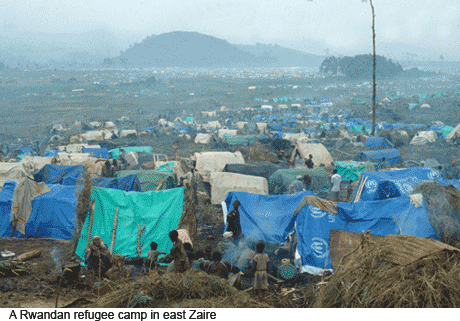 Like many Rwandans (Hutus and Tutsis alike) Umutesi still lives in exile. I called her at her home in Belgium to talk about Rwanda’s multiple tragedies. At the onset of the civil war in 1990, Umutesi was the director of an organization supporting farmers’ cooperatives and had friends belonging to all strata of Rwandan society.
Like many Rwandans (Hutus and Tutsis alike) Umutesi still lives in exile. I called her at her home in Belgium to talk about Rwanda’s multiple tragedies. At the onset of the civil war in 1990, Umutesi was the director of an organization supporting farmers’ cooperatives and had friends belonging to all strata of Rwandan society.
Felix Holmgren: How did people in Rwanda react to the first attack of RPF from Uganda?
Marie Béatrice Umutesi: Everyone was afraid. The Tutsi refugees in Uganda had attacked before, in the 1960s, and it had led to violence against Tutsis and almost to civil war. We were afraid that the same problems would be repeated.
FH: From your book I got the impression that you were almost regarded as an extremist because you criticized the RPF. Did many support the RPF?
MBU: At the beginning of the war, not many people were in favour of the RPF. I had many Tutsi friends and not many of them supported the RPF. But after the initial attack, the government arrested a lot of people, almost ten thousand, mostly Tutsis, and after that many people became RPF supporters.
FH: And you were regarded as government-friendly when you criticized the rebels?
MBU: One has to understand the political situation. After the attack, a multi-party system was put in place. Earlier there had been only one party. Several of the new, anti-government parties allied themselves with the RPF, so that in the new system you either supported President Habyarimana or the RPF. Society was divided into two camps and I, who was an NGO representative with sympathy for neither side, was attacked by both.
The democratization made people think and gave them the opportunity to criticize political decisions, but the political leaders misused the system to foment conflict based on geographic and ethnic tensions. So, for example, someone might support the Liberal party, knowing nothing about liberalism, simply because he was Tutsi. In the same way, the Social Democratic party had nothing to do with social democratic politics, but simply united people from southern Rwanda. In the north, people supported Habyarimana’s party, not because of its political programme – such a thing did not exist – but because he was from the north. In this way, social networks were torn apart.
FH: During the same period, the parties’ youth sections were formed. Several of those, like the Interahamwe, developed into militias which were at the forefront of the genocide.
MBU: Yes, it was easy for the parties to enrol youths. Rwanda is a small and overpopulated country and most young people have nothing to do and lack resources. They were an easy prey for the various political parties and for the RPF rebels.
FH: It is often claimed that Rwandans’ deference to authorities was a crucial factor in the unfolding of the genocide. Do you agree with that?
MBU: I agree entirely that Rwandans tend to obey authorities. But under the multi-party system the authorities lost their grip on power. Young people were no longer told to respect authorities, and when the genocide started the power was with the people in the street.
FH: Do you regard the Interahamwe as an example of total obedience or of its opposite?
MBU: Every little militia ruled their sector. The militia in my neighbourhood in Kigali was fully autonomous and did as it pleased. Its leader held absolute power over all of us; if he had had the urge to kill me he would have been done, without need for approval. Each militia ruled supreme in their area. They obeyed their leader, but there was no national network or anything like that. Not even the leaders had any influence outside of their own area.
FH: In your book, you also describe the situation for those forced to flee during the war, something which is seldom mentioned in discussions about Rwanda in the early 1990s.
MBU: Before April 1994 one million people were fleeing the war. Do you realize what this means? One million persons had gathered around Kigali. And when the genocide began and the RPF advanced, virtually the whole population was on the move.
Later it was claimed that those who fled Rwanda were afraid because they had participated in the genocide, but people had in fact begun to flee at the onset of the war in 1990, and on the eve of the genocide one million people had fled the RPF massacres. Those who fled in 1994 were already internal refugees.
FH: Why did you decide to flee after the genocide?
MBU: It’s not something you decide to do. You do it because you are afraid of dying.
FH: So when the RPF gained power there was no doubt that you had to leave the country?
MBU: For me there was no doubt. I’m from Byumba, where the war began, and a big part of my mother’s family had been killed by the RPF. I knew the RPF’s methods all too well, and I had seen them in action. Escaping was the only option for me.
FH: The refugee camps in eastern Zaire gained a reputation for harbouring groups who planned a continuation of the genocide. What was your impression of how the camps were administrated?
MBU: I was among the first to escape so when I arrived there were no camps. Then we lived in one of the first camps, a very small camp run by the Order of Malta. But most of the refugees were still in Bukavu, in the school and out in the streets. The UNHCR didn’t want any camps to be established, but little by little they appeared.
Inera, the camp where I stayed the longest, was run by Caritas International. It wasn’t Rwandans who were in charge of the camps but various humanitarian organizations. A Spanish priest was the director of Inera. We heard on radio and read in European papers that the camps were strongholds for genocide perpetrators who prevented other refugees from returning home, but I never experienced anything like that.
FH: Were there former government soldiers in the camps who wanted to return to Rwanda and fight?
MBU: Everyone who came to the camps were civilians. There were special camps for the military more than sixty kilometres away, but in order to be allowed into the civilian camps the soldiers had to give up their arms and become civilians. I myself never saw any troops or military exercises, which were said to be held in the camps, during all the time we endured there.
We hardly had food for the day; how could we have bought weapons? Instead of caring about the suffering refugees and the children who died every day, people worried only that those in the camps would attack Rwanda. Let me just say that this was an invention of western journalists.
FH: At that point, under what conditions would you have considered returning to Rwanda?
MBU: I visited Belgium in 1995 and lectured about the refugee camps and voiced my opinion about the situation in Rwanda, and I was also interviewed on the radio. My views were the same as they are today. All Hutus did not participate in the genocide and all Tutsis are not victims. Hutus as well as Tutsis committed crimes against humanity. For me, the only way to proceed would be to arrest everyone who is guilty and prosecute them so that all Rwandans can feel that justice has been done. The interview reached ears in Rwanda and I was informed through friends that I couldn’t return home. At best I would have been imprisoned and at worst killed.
FH: How about other refugees? What would have persuaded them to return to Rwanda?
MBU: Life in the camps was so arduous that I think people would have returned home if they hadn’t feared for their lives, but the security situation in Rwanda was disastrous. One report concluded that the RPF was responsible for massacres of more than thirteen thousand people. An article in the French paper Libération said that more than a hundred thousand people had been killed by the RPF. We were flooded with such information.
* * *
In October 1996 the camps in eastern Zaire were attacked. Hundreds of thousands of people were forced to flee once again. They were hunted over vast stretches of land and attacked with automatic guns and grenade throwers in temporary camps, at river passages, and in villages where they sought shelter. Many died during the long marches through the tropical jungle. Attempts to investigate these crimes have been obstructed and delayed, but it is probable that as many as two hundred thousand people died during these events.
Umutesi herself fled by foot more than two thousand kilometres and daily witnessed how emaciated people of all ages died alone at the side of the road, while those who were still alive were perpetually goaded on by their pursuers. She nearly died of fever and malnutrition during the long flight through the equatorial jungle.
FH: The events of 1996, when the camps were destroyed, are unknown to many in the West. Can you explain who attacked the refugee camps?
MBU: At first it was claimed that it was Congolese rebels, but in reality it was soldiers of the RPF who hunted the refugees. Most of them were Rwandan soldiers.
FH: Did they have any allies?
MBU: Yes, I believe they did. How else could a country like Rwanda be at war for so many years? When we fled through the jungle, we used to see small surveillance aircraft circling above us. We thought they were there to deliver food, but each time after seeing one, we soon had the RPF on our heels. When I came to Europe I was told that these were American planes. I met other refugees who told me that before their camp had been attacked and destroyed, American troops with megaphones had arrived and exhorted the refugees to return to Rwanda, saying that they would risk being killed if they stayed on.
FH: Is it possible that those who hunted the refugees did it with good intentions – because they wanted you to return to Rwanda – or did they only want to kill you?
MBU: When they captured people at the border, they classified them. Those who were clean, well-dressed, had braids and seemed to be intellectuals or rich were killed, while those who were bony and badly dressed were repatriated to Rwanda. But the deeper into the jungle we got, the more indiscriminate the killing became.
FH: So you have no doubt that their aim was to kill?
MBU: In Ingende, for example, in western Congo, they killed between one thousand and fourteen hundred people; women, children, and men. Why would they kill that many if the purpose was to get them to return home? Maybe if they had killed twenty, but more than a thousand… The purpose is clear, isn’t it? It hardly requires discussion.
FH: Can you describe the role played by the UN Refugee Agency, UNHCR, during this time?
MBU: In theory, the UNHCR exists to protect refugees, but in our case the UNHCR wanted to repatriate us at any cost, regardless of whether it was safe in Rwanda or not, and they took measures to force us to return. They offered the Congolese ten dollars for every captured refugee, an enormous sum for a country in crisis, like the Congo. They made people who lived in extreme poverty hunt refugees like animals.
FH: Having survived these events, you wrote about them, not only in your book but also in an academic article. Was it a hard decision to make, to write about your experiences?
MBU: When I left the jungle I just wanted to forget it all. But it was impossible. I was very angry and frustrated, and I thought that the international community had betrayed first the Tutsis during the genocide, and then us, as we fled through the Congo. I had lost friends in the jungle, and several children I had travelled with. I didn’t want them to be forgotten. Writing was my way of honouring their memory.
When I asked people how they could leave us to die in the jungle, they said: “We didn’t know. The papers didn’t write about it.” I thought that if I write a book nobody can say they don’t know. I wanted to make people understand that war isn’t just about armies and bombs, but about human lives, personal tragedies, common men and women. By telling the story of myself and my companions I hoped that people would wake up. But I was mistaken.
FH: Do you think so?
MBU: Now I believe that people knew very well what was going on but didn’t do anything about it.
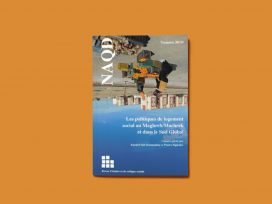
 Like many Rwandans (Hutus and Tutsis alike) Umutesi still lives in exile. I called her at her home in Belgium to talk about Rwanda’s multiple tragedies. At the onset of the civil war in 1990, Umutesi was the director of an organization supporting farmers’ cooperatives and had friends belonging to all strata of Rwandan society.
Like many Rwandans (Hutus and Tutsis alike) Umutesi still lives in exile. I called her at her home in Belgium to talk about Rwanda’s multiple tragedies. At the onset of the civil war in 1990, Umutesi was the director of an organization supporting farmers’ cooperatives and had friends belonging to all strata of Rwandan society.

